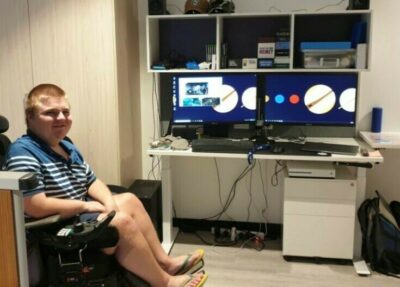The Loop Guide to Life After School
Finishing secondary school is an exciting time but you might also have lots of questions if you are considering post-secondary education or training. It is important to know your options, be confident about how to get support if you need it and be informed about some of the issues and challenges you might face.
Post-secondary studies
In this section you will find information about:
- planning for post-secondary education
- your rights
- support services available
- access plans
- financial assistance
- where to get more information
Planning for post-secondary education
There are many options if you’re considering hitting the books after finishing high school, including studying at university, TAFE or a Registered Training Organisation.
When you have a disability, it may take some extra planning and preparation to successfully move into tertiary education. But it is definitely possible!
There are some great resources from The Australian Disability Clearinghouse on Education and Training (ADCET), an Australian government website, that provide support, practical steps to follow and guidance when you are thinking about post-secondary school studies. The resources can help you to plan what you want to do, understand what supports you can access and where to go to find more information.
This section of the ADCET website provides information and resources for current or potential students with a disability who are considering post-school study at university or TAFE. It can help you:
- plan for post-secondary education
- understand the entry pathways
- know your rights
- link with appropriate supports
- manage your studies
- plan for graduate employment
Your rights
Under the Disability Standards for Education 2005, students with a disability must have the same opportunities and choices to access and participate in education as students without a disability.
All education and training providers are obliged to protect your rights by consulting with you, making reasonable adjustments to accommodate your needs and eliminating harassment and victimisation.
This section of the ADCET website provides further information on your rights, obligations of providers, and actions to take if you feel you have been unfairly treated by a post-secondary education or training provider.
Support services at universities and TAFE
Universities and TAFEs provide support services for students with disabilities. This may include:
- alternative arrangements for exams and assessments
- adjustments to learning materials and how coursework is delivered
- equipment and assistive technology
- accessible accommodation on campus
- library services
Each university or TAFE will have disability services coordinators or staff who meet with prospective students to help plan their university studies. As soon as you know which university or TAFE you will be attending, get in touch with disability services to give you time for any adjustments to be made before you start studying. Disability Services staff will discuss with you the nature of your condition, and its likely impact on your studies. They will explain the types of supports that are available and how a plan, often referred to as an Access Plan, can be put in place to ensure you receive the support you need. Not all students with a disability will need, or want, an access plan but registering with disability services and seeking advice about what support is available will give you the greatest chance for success with your studies.
Disability Services at Universities provides a list of universities in each state and links to the contact details for support services provided by each university.
Disability Services at TAFEs provides a list of TAFEs in each state and links to the contact details for support services provided by each TAFE.
Access plans
Disability Services staff can work with you to develop an access plan if you are needing additional support or arrangements to participate in your studies on the same basis as other students. This is a document that outlines the reasonable adjustments and support you need to access your study at university or TAFE, and is based on information provided by yourself and a report from your health practitioner. If required, the recommendations and suggestions in you access plan can also be shared with the Faculty and teaching staff so everyone involved in your learning understands the adjustments required. For more information about access plans, contact disability services at your university or TAFE.
Financial assistance
There are several types of financial assistance that you may be eligible, depending on your circumstances. This could include:
- study-related financial support
- income support and other allowances
- transport subsidies
- other loans
- NDIS. The National Disability Insurance Scheme (NDIS) website also has information about the support that is available if you have an NDIS plan when leaving school.
- scholarships.
The ADCET website contains more information about financial assistance you may be able to access while studying.
Further information
National Disability Coordination Officer Program
The National Disability Coordination Officer (NDCO) Program helps people with disability access, and participate in, tertiary education and subsequent employment through a national network of NDCOs.
Get ready for study and work resources
On this page, you can access Get Ready for Study and Work student workbook and Parent Guide from the National Disability Coordination Officer Program in South Western and Western Sydney. There is also a workbook for young Aboriginal and Torres Strait Islander people with a disability. These resources are based on ten top tips for young people with disability. They contain information, contacts and activities to help students make a successful transition from school into tertiary study, work or post-school programs.
School Leaver Employment Supports
This resource provides information on what School Leaver Employment Supports (SLES) are, how SLES can benefit you and how you can choose a SLES provider.
Have advice, 'how to' guides or a story you want to share? We want to hear from you!
You can submit your story or guide via our form. Provided your content meets our content requirements, your post will be published by a Loop moderator to the Living Life section.
Share your story


